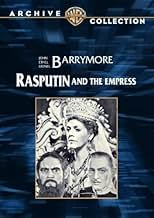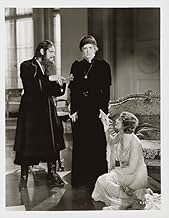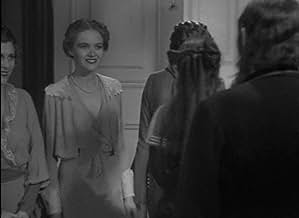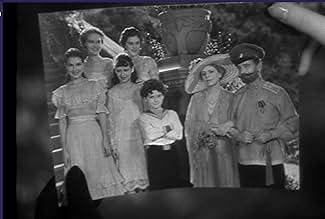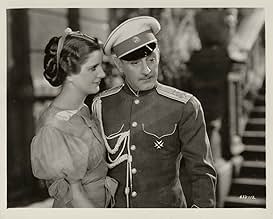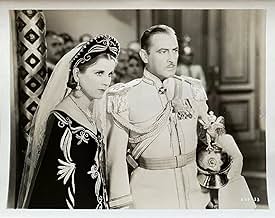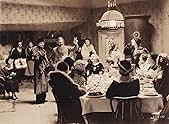IMDb RATING
6.5/10
1.3K
YOUR RATING
A prince plots to kill the mad monk Rasputin for the good of the czar, the czarina and Russia.A prince plots to kill the mad monk Rasputin for the good of the czar, the czarina and Russia.A prince plots to kill the mad monk Rasputin for the good of the czar, the czarina and Russia.
- Nominated for 1 Oscar
- 4 wins & 1 nomination total
Luis Alberni
- Photographer's Assistant
- (uncredited)
Mary Alden
- Natasha's Lady in Waiting
- (uncredited)
Robert Anderson
- Undetermined Secondary Role
- (uncredited)
Oscar Apfel
- Undetermined Secondary Role
- (uncredited)
Henry Armetta
- Photographer
- (uncredited)
Hooper Atchley
- Rasputin's Henchman
- (uncredited)
Mischa Auer
- Butler Pouring Drinks at Party
- (uncredited)
Barbara Barondess
- Woman Getting Cigarette
- (uncredited)
Max Barwyn
- Bald Man Trying to See Duna
- (uncredited)
Featured reviews
A prince plots to kill the "mad monk" Rasputin for the good of the czar, the czarina and Russia.
In something of a minor epic, this film tells of the rise and fall of Rasputin, the "mad monk". How much is true and how much is legend is open to debate, but all the classic parts of the story are told here. If you are vaguely familiar with the story of Rasputin, this film should feel like you've seen it before (in a good way).
Everything about the film is quite good, from the acting to the costumes and beyond. This is, of course, a showcase for the Barrymore family, and it really does show how much they each contributed to the acting greatness of American cinema.
In something of a minor epic, this film tells of the rise and fall of Rasputin, the "mad monk". How much is true and how much is legend is open to debate, but all the classic parts of the story are told here. If you are vaguely familiar with the story of Rasputin, this film should feel like you've seen it before (in a good way).
Everything about the film is quite good, from the acting to the costumes and beyond. This is, of course, a showcase for the Barrymore family, and it really does show how much they each contributed to the acting greatness of American cinema.
By now, everyone - but everyone - has commented on what bad history this movie is. Fine, I won't argue the point. But, what about it as drama? In my opinion, this is one of the most powerful tales of tragedy of it's time. ( This is particularly noteworthy given MGM's later penchant for frivolousness. ) Part of it has do do with the sincerity and conviction of the story. [ Alhough Charles MacArtur and others are given credit for the screenplay, I believe the original story - I have read a copy of the book - was written by a Russian émigré who fled the revolution. Unfortunately, I am presently unable to locate my copy. ] Nonetheless, this would go a long way towards explaining the movie's passion.
As for the acting; it features an outstanding cast, including the three Barrymores, as well as an assemblage of first rate supporting actors of the time. ( Anyone notice Edwarld Arnold as Dr. Remezov? ) Of course, much of it seems dated by today's standards. ( This was 1932, after all. ) Keep in mind that this is high melodrama. In that context, Lionel Barrymore exudes pure evil as the scheming, mad monk. He also brings out the crudity and vulgarity of the man, which generally jibes with historical accounts. Just try not to dwell on the fake beard.
John is fine and properly earnest as Prince Chegodieff, although his performance does seem a bit old-fashioned next to Lionel's. He really lets it all hang out in the murder scene, however. Ethel seems a trifle stiff, but Ralph Morgan is just right as Nicholas. In fact, sincerity and seriousness of purpose seem to be the hallmarks of the entire ensemble. And through it all, there is this sense of tragic inevitability; of events that, once set in motion, cannot be reversed.
One other thing that warrants a mention is the music. The Russian Orthodox liturgical music used in the celebratory scene near the beginning is moving and powerful. It could well put one in mind of the the wedding scene in Michael Cimino's "The Deer Hunter" ( 1978 ). Later, there is a medley of martial music, accompanied by historical footage, as Russia mobilizes for The Great War. Here we hear "God Save the Tsar", a tune which Mikhail Glinka featured in his opera, "A Life for the Tsar", but which was routinely banned during Soviet performances. All in all, exciting stuff.
This is a movie well worth watching, historical accuracy notwithstanding.
As for the acting; it features an outstanding cast, including the three Barrymores, as well as an assemblage of first rate supporting actors of the time. ( Anyone notice Edwarld Arnold as Dr. Remezov? ) Of course, much of it seems dated by today's standards. ( This was 1932, after all. ) Keep in mind that this is high melodrama. In that context, Lionel Barrymore exudes pure evil as the scheming, mad monk. He also brings out the crudity and vulgarity of the man, which generally jibes with historical accounts. Just try not to dwell on the fake beard.
John is fine and properly earnest as Prince Chegodieff, although his performance does seem a bit old-fashioned next to Lionel's. He really lets it all hang out in the murder scene, however. Ethel seems a trifle stiff, but Ralph Morgan is just right as Nicholas. In fact, sincerity and seriousness of purpose seem to be the hallmarks of the entire ensemble. And through it all, there is this sense of tragic inevitability; of events that, once set in motion, cannot be reversed.
One other thing that warrants a mention is the music. The Russian Orthodox liturgical music used in the celebratory scene near the beginning is moving and powerful. It could well put one in mind of the the wedding scene in Michael Cimino's "The Deer Hunter" ( 1978 ). Later, there is a medley of martial music, accompanied by historical footage, as Russia mobilizes for The Great War. Here we hear "God Save the Tsar", a tune which Mikhail Glinka featured in his opera, "A Life for the Tsar", but which was routinely banned during Soviet performances. All in all, exciting stuff.
This is a movie well worth watching, historical accuracy notwithstanding.
This is a reasonably decent movie, well acted (particularly by Lionel, who practically chews the scenery as Rasputin) and the sets and costumes are fairly nice. But the main selling point is that this is the only time the three Barrymores -Ethel, John and Lionel did a movie together. It's a good movie but could have been much better.
...forget about it. This film is completely inaccurate in its portrayal of actual events in Russian history. As for the nature and character of the historical figures involved, the three Barrymores give good renditions. There is Ethel Barrymore looking every inch the empress and giving a convincing portrayal of a woman concerned for the welfare of her very ill son - and I would expect that. What I didn't expect is how weird it would be to watch a film in which John Barrymore is the shining hero and Lionel Barrymore is a truly diabolical villain, and each are spectacularly convincing in their portrayals. Lionel is really the center of attention here as he plays the evil Rasputin whose ability to sidestep assassination attempts is legendary, and here a few logical explanations are given to some of his alleged abilities. However, none can explain what happened at the end of his life - how he was poisoned, bludgeoned, shot, and finally thrown into an icy river and still managed to cling to life for awhile.
Although Tsar Nicholas is accurately portrayed as a rather weak willed man and the Romanov marriage is also accurately portrayed as one of the few royal arranged marriages that also turned out to be a love match, there is a mischaracterization of the Tsar as being progressive and wanting a Duma only to have Rasputin defeat that plan. In fact, Nicholas was autocratic in his outlook and distrusted any attempt to give the people more say in their government. This sets up one of the great ironic struggles in the film - that of aristocrat Prince Paul Chegodieff (John Barrymore) wanting more for the peasants in the way of both bread and democracy, and that of peasant mystic Rasputin (Lionel Barrymore) saying that it was God's will that the peasants were poor and powerless. Paul wants to save Russia, Rasputin wants to rule it.
Another piece of fiction shown in the movie for dramatic measure are the public proclamations about the illness of Tsaravich Alexai, the heir to the Russian throne. In fact one of the things that turned the Russian people against the royal family - besides the fact that they were starving during WWI - was that the people assumed that Rasputin's hold over the empress was because they were lovers. The Romanovs did not want it to be known that the only son in the family and heir to the throne had a serious disease - in this case hemophilia - that kept him in very delicate health and would likely lead to a greatly shortened lifespan. They felt it would leave them vulnerable to the overthrowing of their rule. Ironically hiding the truth and leaving Rasputin's relationship to the empress unexplained also led to exactly that.
Watch this one for the high production values and compelling performances by the members of Hollywood's royal family during its golden age, but as for a Russian history lesson, look elsewhere.
Although Tsar Nicholas is accurately portrayed as a rather weak willed man and the Romanov marriage is also accurately portrayed as one of the few royal arranged marriages that also turned out to be a love match, there is a mischaracterization of the Tsar as being progressive and wanting a Duma only to have Rasputin defeat that plan. In fact, Nicholas was autocratic in his outlook and distrusted any attempt to give the people more say in their government. This sets up one of the great ironic struggles in the film - that of aristocrat Prince Paul Chegodieff (John Barrymore) wanting more for the peasants in the way of both bread and democracy, and that of peasant mystic Rasputin (Lionel Barrymore) saying that it was God's will that the peasants were poor and powerless. Paul wants to save Russia, Rasputin wants to rule it.
Another piece of fiction shown in the movie for dramatic measure are the public proclamations about the illness of Tsaravich Alexai, the heir to the Russian throne. In fact one of the things that turned the Russian people against the royal family - besides the fact that they were starving during WWI - was that the people assumed that Rasputin's hold over the empress was because they were lovers. The Romanovs did not want it to be known that the only son in the family and heir to the throne had a serious disease - in this case hemophilia - that kept him in very delicate health and would likely lead to a greatly shortened lifespan. They felt it would leave them vulnerable to the overthrowing of their rule. Ironically hiding the truth and leaving Rasputin's relationship to the empress unexplained also led to exactly that.
Watch this one for the high production values and compelling performances by the members of Hollywood's royal family during its golden age, but as for a Russian history lesson, look elsewhere.
Rasputin and the Empress (1932)
*** (out of 4)
Lionel, John and Ethel Barrymore star in this film, which was the only one that all three legends appeared in together. After her son is near death, Czarina Alexandria (Ethel) lets the monk Rasputin (Lionel) pray with her son who eventually heals and the monk gives credit to God. Saving her son, the monk soon finds himself gaining power inside the government but this doesn't sit well with Prince Chegodieff (John) who will stop at nothing to prove the monk is mad. Apparently MGM was sued due to how inaccurate the story is here so if you want a history lesson you should go read a book but if you want to see all three Barrymore's together then this is the only film out there that will suit you. The film should have been a lot better than it is but the thing drags at several points and I'm sure fifteen or so minutes could have been trimmed from the 123-minute running time, although apparently the film ran longer when originally released. The performances aren't what you'd expect but it's certainly fun seeing the three Barrymore's working together. Lionel actually goes way over the top, which is something you'd expect from John but he actually manages to be quite calm and cool throughout the film. John certainly gives the best performance but it's Lionel who steals the film with his fake beard and over the top antics. Ethel is good in her role as is the supporting work from Ralph Morgan. The costumes and set design are wonderful and I really enjoyed the made up ending, which contains some pretty strong violence.
*** (out of 4)
Lionel, John and Ethel Barrymore star in this film, which was the only one that all three legends appeared in together. After her son is near death, Czarina Alexandria (Ethel) lets the monk Rasputin (Lionel) pray with her son who eventually heals and the monk gives credit to God. Saving her son, the monk soon finds himself gaining power inside the government but this doesn't sit well with Prince Chegodieff (John) who will stop at nothing to prove the monk is mad. Apparently MGM was sued due to how inaccurate the story is here so if you want a history lesson you should go read a book but if you want to see all three Barrymore's together then this is the only film out there that will suit you. The film should have been a lot better than it is but the thing drags at several points and I'm sure fifteen or so minutes could have been trimmed from the 123-minute running time, although apparently the film ran longer when originally released. The performances aren't what you'd expect but it's certainly fun seeing the three Barrymore's working together. Lionel actually goes way over the top, which is something you'd expect from John but he actually manages to be quite calm and cool throughout the film. John certainly gives the best performance but it's Lionel who steals the film with his fake beard and over the top antics. Ethel is good in her role as is the supporting work from Ralph Morgan. The costumes and set design are wonderful and I really enjoyed the made up ending, which contains some pretty strong violence.
Did you know
- TriviaAnnoyed that his brother John Barrymore was trying to show him up by placing his hand on him while he was finishing a scene (an ancient actor's technique for drawing attention to oneself), Lionel Barrymore excused himself from the set and went to the back lot to find a telephone. He then phoned the set and told director Richard Boleslawski that "he'd better advise Mr. John Barrymore to not place his hand on me at the close of this scene, lest I lay one on him!" By the time Lionel returned to the set, John has been advised to keep his hands to himself.
- GoofsThe fact that the Tsarevich was sick was not announced publicly as portrayed in the movie. It was kept a secret.
- Quotes
Natasha: You don't like him because he's so outspoken. You don't like his manners. Isn't that it?
Prince Chegodieff: No, that's not it. It, its his, smile. It's like a man-eating shark with a bible under his fin.
- Alternate versionsUpon its premiere "Rasputin and the Empress" ran approximately 132 minutes. Due to the famous lawsuits against it, a number of scenes had to be cut for legal reasons. One critical scene that was deleted was one which implied that Rasputin had raped Diana Wynyard's character of "Princess Natascha". The removal of this scene tended to make the character of Princess Natascha somewhat incomprehensible - initially she is a supporter of Rasputin; in the latter part of the film she is very afraid of him. Unless the viewer is aware of the cuts made in the film, there does not appear to be any explanation for the change in Princess Natascha toward Rasputin.
- ConnectionsFeatured in Biography: The Barrymores (2002)
- SoundtracksRussian National Anthem
(uncredited)
[Played during the opening credits and at the end]
- How long is Rasputin and the Empress?Powered by Alexa
Details
Box office
- Budget
- $1,022,000 (estimated)
- Runtime
- 2h 1m(121 min)
- Color
- Aspect ratio
- 1.37 : 1
Contribute to this page
Suggest an edit or add missing content

